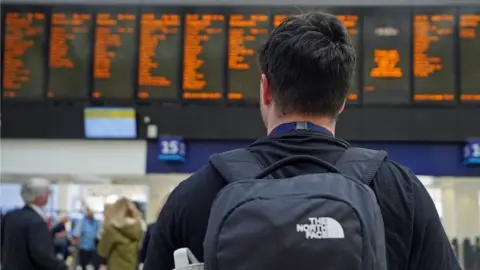Train strikes: Passengers told to avoid travel on Saturday
 PA Media
PA MediaPassengers should avoid travelling by train unless absolutely necessary on Saturday due to expected widespread disruption from strikes, the rail industry has said.
Unions are striking as part of a long-running series of disputes over jobs, pay and conditions.
Only a fifth of trains are set to run on Saturday, with services starting late and finishing early.
RMT union members in 15 rail companies and Network Rail will strike.
This is the eighth day of action taken by the union over pay and conditions.
They will be joined by members of the TSSA union, who staff station ticket offices and work in on-board operational roles, affecting Avanti West Coast, c2c and Transpennine Express services.
Disruption is set to continue into Sunday morning.
National Rail Enquiries warned customers that it is "inevitable that services will be cancelled or severely disrupted".
"There will be a very limited service on Saturday 8 October with no service at all in some places. Please only travel by train if your journey is absolutely necessary, plan ahead and check before you travel."
Passengers with advance, off-peak or anytime tickets affected by the strikes can use their ticket on Friday, or up to and including three days later, rail operators said.
People can also change their tickets to travel on an alternate date or get a refund if their train is cancelled or rescheduled.
The RMT strikes will be widespread due to Network Rail's signalling staff striking across England, Scotland and Wales, so even where train operators are not directly involved in the dispute, only a fraction of usual services will run.
For example, the last direct train from Newcastle to London will leave at 13:53 and the last train from London to Nottingham will go at 16:32.
There will be no trains between London and Edinburgh, with passengers having to travel via Glasgow. Nor will there be any direct services between London and Norwich.
Separately, there will be further strikes on Monday in Scotland after the RMT rejected a 5% ScotRail pay offer which it described as a "kick in the teeth".
ScotRail warned of "significant disruption" to services, saying it would run "very limited" services on just three lines on the day.
Trains will only run between 07:30 and 18:30, with two an hour between Milngavie and Edinburgh via Bathgate, and one train an hour between Glasgow and both Lanark and Larkhall.
'Unshackle' operators
The RMT said more than 40,000 railway workers would take part in the action on Saturday.
In an open letter to Transport Secretary Anne Marie Trevelyan, RMT general secretary Mick Lynch suggested the ongoing dispute would cost the government more than £100m.
The government should "unshackle" the train operators, he wrote, suggesting the Department for Transport's role in the strike was blocking the path to a settlement.
Manuel Cortes, general secretary of the TSSA union, described workers' demands as "reasonable", saying his members deserved a pay rise after several years of pay freezes.
"We urge employers and government to bring forward talks to find a resolution to the concerns that rail workers have over pay, conditions and job security," Mr Cortes said.
On Wednesday, Ms Trevelyan told the BBC she wanted unions and train operators to "come together and find something that we can all live with".
She continued "nothing is ever perfect, negotiations are compromises, but what we need is for our customers, our passengers to be at the centre of everyone's decision making."
Since taking up her post last month, the transport secretary has met the leaders of the RMT and Aslef unions. She also told the BBC she would also meet the train companies over the next few weeks.
